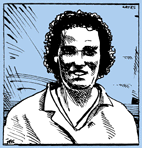| crime.files |
| |
 |
|

| crime.features |
| |
 |
|

| crime.resources |
| |
 |
|

| crime.co.nz |
| |
 |
|


|
 |  |

Gay Oakes
In January 1993 Gay Oakes gave her partner Doug Gardner a drugs overdose, and after his death the following morning, hid his body on her property at 14 Hutchison Street, Christchurch. Fourteen months later, she was convicted of murder and sentenced to life imprisonment.
Oakes has recently written a book while in prison Decline into Darkness in which she describes a life of beatings and mental torture at the hands of her de facto husband. She writes that Gardner stole money from her and continued to harrass her even though she had left him. Oakes’s fears of what he would do that night led her to drug his coffee with pills. She writes she did not intend killing him, she just wanted to put him to sleep to escape more abuse. After Gardner fell asleep, Oakes dragged him into her bedroom and left him on the floor, out of sight of her children so they would not be disturbed. She said Gardner was still breathing when she got up in the morning, but later, when she returned from shopping, he had died.
She wrote that she panicked, and she and a friend buried Gardner under a lean-to beside the garage on her property. Fourtee
 |
 |
 |
 |
| Oakes’ story is controversial, with her many supporters claiming she did not deserve life imprisonment because she was suffering from a condition known as Battered Women’s Syndrome. |
 |
 |
n months later, after a tip-off, police exhumed Gardner’s remains. Oakes was charged with murder, was convicted and received the mandatory life imprisonment sentence. She unsuccessfully appealed, blaming Battered Women’s Syndrome for her actions. Lawyer Judith Ablett-Kerr is now acting for her and an appeal to the Governor General for intervention is proceeding.
Oakes’s efforts to avoid detection seem to have damaged her defence. Commentators say had she reported the death immediately the courts are likely to have treated her more kindly. However, her actions in burying Gardner rather than reporting his death did not earn sympathy, nor did her denial of any knowledge of Gardner’s whereabouts when interviewed by police soon after his death. Gardner’s family have participated in the media debate saying he was not the monster Oakes made him out to be.
|
 |
|

The case of Doug Gardiner and his murder. |

 |
 |

 |
 |
|